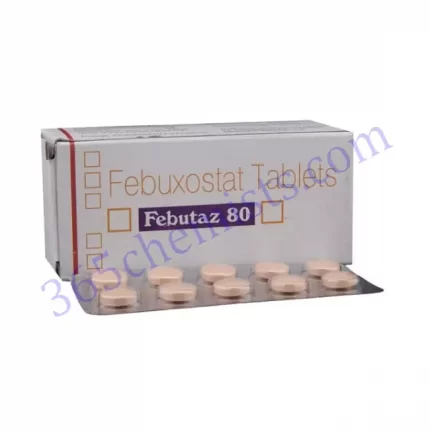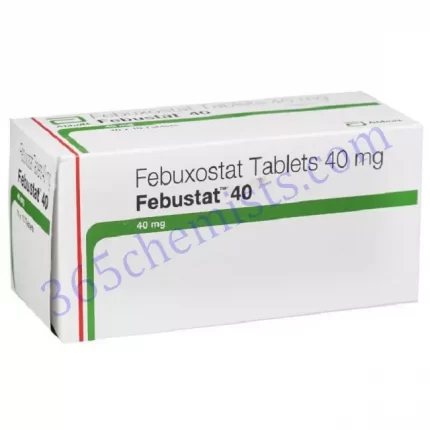Febucip 80mg Tablet (Febuxostat 80mg)
febuxostat is the active component of the medication known as Febucip 80mg Tablet, which comes in a dosage form with a strength of 80mg. The primary application for this medication is the management of hyperuricemia in patients who suffer from gout. It is classified as an inhibitor of the enzyme xanthine oxidase, which is a class of medication. Hyperuricemia is a condition that is characterised by elevated levels of uric acid in the blood, which can lead to the formation of urate crystals in the joints, which causes pain and inflammation. Urate crystals are formed when there are elevated levels of uric acid in the blood. This detailed explanation of Febucip 80mg Tablet is intended to offer readers an in-depth comprehension of the medication, covering topics such as its applications, dosage, potential adverse effects, safety precautions, and more.
Uses of Febucip 80mg Tablet
The most common application for the Febucip 80mg Tablet is the long-term management of hyperuricemia in patients who suffer from gout. The production of uric acid is stopped when the enzyme xanthine oxidase, which is responsible for that process, has its activity inhibited. Febucip works to reduce the production of uric acid, which in turn helps to lower the levels of uric acid in the blood. This helps to prevent the formation of urate crystals, which in turn helps to reduce the frequency and severity of gout attacks. It is essential to keep in mind that Febucip is not designed to treat acute episodes of gout pain or inflammation.
Dosage and Administration
It is possible for the dosage of one tablet of Febucip 80 mg to change depending on the severity of the hyperuricemia as well as the individual’s reaction to treatment. It is essential to adhere to your healthcare provider’s recommendations regarding dosage as well as the length of time you should undergo treatment. Oral administration of one tablet containing 80 mg is recommended, and this can be done once daily, with or without food. Your physician will evaluate your condition and determine the appropriate dosage, as well as the length of time you will need to undergo treatment. In order to effectively manage hyperuricemia, it is essential to keep taking Febucip as prescribed, even if there are no symptoms of the condition at the moment.
Related Product
Febucip 40mg Tablet
Febucip 80mg Tablet
Possible Side Effects
Febucip 80 mg Tablet is generally well tolerated; however, some people may experience certain adverse effects when taking this medication. Nausea, diarrhoea, headaches, and abnormalities in liver function tests are typical adverse reactions that can occur when taking this medication. These adverse effects are typically mild and transient, and they go away on their own without the need for any special treatment. However, it is recommended that you talk to your healthcare provider if any side effects continue or become bothersome after taking the medication. Extremely severe allergic reactions have been known to happen, but only very rarely. In the event that you experience symptoms such as a rash, itching, swelling, dizziness, or difficulty breathing, you should seek medical attention as soon as possible.
Precautions and Warnings
It is imperative that you inform your healthcare provider about any preexisting medical conditions prior to taking the Febucip 80mg Tablet. These conditions may include issues with the liver or kidneys, cardiovascular diseases, or any allergies. Because of the potential for this medication to interact with other medications, such as azathioprine or mercaptopurine, the dosage may need to be adjusted or the patient may need to be closely monitored. It is essential, therefore, that you provide your doctor with a comprehensive list of all the medications that you are currently taking in order to avoid any potential adverse reactions caused by drug interactions. In addition, it is imperative that you discuss the potential risks and benefits of using this medication with your healthcare provider if you are pregnant, have plans to become pregnant in the near future, or are currently breastfeeding.
Storage and Handling
The recommended storage conditions for Febucip 80mg Tablet are room temperature, protection from direct sunlight, and avoidance of moisture. Make sure that both children and animals can’t get their hands on the medication. After the expiration date that is printed on the packaging of the Febucip 80mg Tablet, do not use the medication. You should throw away any medication that has been used but is no longer effective, following the instructions that are included in the regulations that govern the disposal of waste in your area.
Conclusion
Patients suffering from gout can benefit from taking the effective medication Febucip 80mg Tablet, which contains febuxostat 80mg. This medication is used for the long-term management of hyperuricemia in these patients. It does this by lowering the amount of uric acid that the body produces, which in turn helps stop the growth of urate crystals and lessens the frequency and severity of gout attacks. It is essential to take the medication exactly as directed, adhering to any and all precautions, and being aware of any potential adverse effects. Consult your healthcare provider for individualised advice and direction regarding the use of the Febucip 80mg Tablet if you have any concerns or questions regarding its use. Patients can experience an improvement in their quality of life as well as a reduction in the symptoms related to gout if they have their condition properly managed and take their medication.











